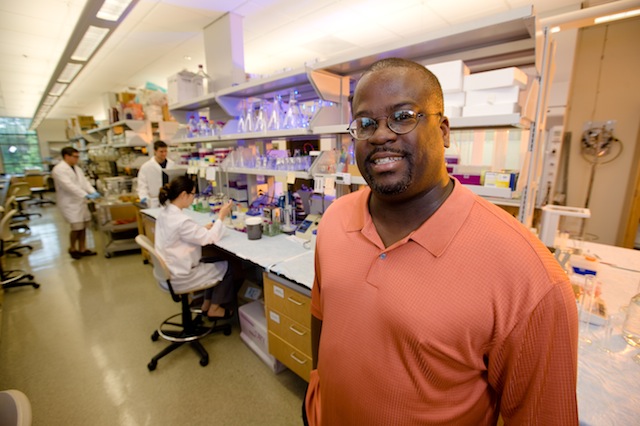University Awards Grants Totaling $1.58 Million Through Arkansas Biosciences Institute

Roger Koeppe II, Distinguished Professor of chemistry and biochemistry
FAYETTEVILLE, Ark. — The University of Arkansas, with funding from the Arkansas Biosciences Institute, has awarded grants for 37 science and technology research projects for fiscal year 2015.
The institute is a partnership of scientists at five research institutions across Arkansas, including the state’s flagship university in Fayetteville, with a focus on supporting biomedical research and agricultural research with medical implications.
The fiscal 2015 grants at the U of A totaled $1.58 million, said Roger Koeppe II, Distinguished Professor of Chemistry and Biochemistry, who represents the flagship on the institute’s scientific coordinating committee. Additionally, the campus received $208,000 in matching funds from the National Institutes of Health for mutual support of pilot projects, Koeppe said.
“The Arkansas Biosciences Institute is important for promoting broadly based university research in areas such as biomedicine and biotechnology,” Koeppe said. “A review panel evaluates the initiatives based on their anticipated impact on the scientific community and potential for eventual publication.”
Institute-supported investigators explore many different body and cellular processes in their search for answers to challenging basic science- and health-related questions.
Koeppe said the institute chooses projects that are both innovative and may need preliminary results in order to compete for research funding on a national level, from agencies such as the National Institutes of Health or the National Science Foundation.
The committee also considers funding for shared equipment, and bridge funding. Multiple researchers may request funding for major instrumentation that they will share, Koeppe said.
Paul Adams, an associate professor of chemistry and biochemistry, received Arkansas Biosciences Institutes grants totaling $69,000 during the past two fiscal years. He used the funds to purchase specific chemicals and reagents needed to do high-resolution biophysical studies, as well as hire a postdoctoral scientist to help carry out the needed experiments to acquire preliminary data that has led to some publications being currently reviewed.
“The data acquired from the results of experiments performed due to ABI funding will help for the development of proposals to seek more federal funding in the very near future,” said Adams, who was awarded a grant this past summer from the Arkansas Science and Technology Authority.
 |
| Paul Adams |
That information can then be used to help design drugs that target the specific protein and stop the cancerous behavior. Adams’ research focuses on Ras proteins, which have been identified in nearly one-third of cancer cell types. Mutation(s) in these proteins can give rise to unique structural aspects, which, in part, may play a role in causing cells to continue growing, a behavior that is a hallmark of cancer cells. Adams and his research team hope to learn more about the interactions involving these proteins that can affect how the proteins work and affect the cells.
Since coming to the university in 2007, Adams has received more than $1.5 million in funding from the National Institutes of Health, the National Science Foundation, Arkansas Biosciences Institute and the Arkansas Science and Technology Authority.
The vision for the Arkansas Biosciences Institute emerged during a statewide planning process for use of the state’s share of the 1998 nationwide tobacco settlement. Health care leaders across the state spoke out in favor of dedicating a portion of the tobacco settlement funds to innovative research that could improve health and help reduce or prevent smoking-related illnesses.
Arkansas voters endorsed the proposed Tobacco Settlement Proceeds Act of 2000, and the Arkansas Legislature enacted the provisions of that proposal as Acts 1569 through 1580 of 2001.
Part of that legislation established the Arkansas Biosciences Institute as a consortium of five research institutions: the University of Arkansas at Fayetteville, the University of Arkansas System’s statewide Division of Agriculture, the University of Arkansas for Medical Sciences, Arkansas State University and Arkansas Children’s Hospital.
Contacts
Roger Koeppe II, Distinguished Professor
Chemistry and Biochemistry
479-575-4976,
rk2@uark.edu
Chris Branam, research communications writer/editor
University Relations
479-575-4737,
cwbranam@uark.edu
Headlines
U of A's Inspirational Chorale Makes Its Carnegie Hall Debut
The U of A's Inspirational Chorale took center stage at Carnegie Hall in March, performing under the direction of professor Jeffrey Murdock to a packed audience at the iconic Stern Auditorium.
The State of Economics With Mervin Jebaraj Set for June 5
U of A economist Mervin Jebaraj will analyze state's economic trends and regional issues in an upcoming talk. Preregistration is required by May 31.
Faculty Demonstrate Dedication to Student Success Through Teaching Credentials
Eight faculty members from across the U of A have earned the prestigious Association of College and University Educators certification in Effective College Teaching.
Artificial Intelligence, Machine Learning Boost Arkansas Animal Science Research
Aranyak Goswami, a bioinformatics specialist, will work with three different departments to boost the research arm of the U of A System Division of Agriculture.
College of Education and Health Professions Doctoral Student Picked for Grosvenor Fellowship
Jessica Culver, a doctoral student in the College of Education and Health Professions Adult and Lifelong Learning program, has been selected as a member of the 2024 Grosvenor Teacher Fellowship.




